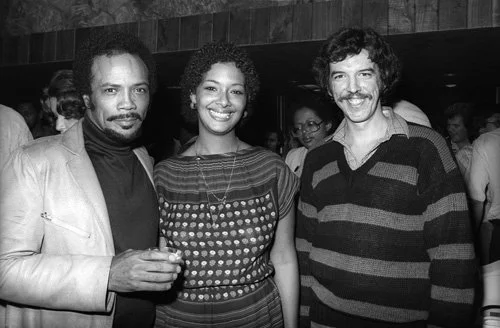The Most Influential Songwriter You've (Probably) Never Heard Of
Meet Rod Temperton: the mastermind behind numerous iconic hits of the disco era, yet a name remains largely unknown to the general public…
In the music industry, the name Rod Temperton is a heavyweight. If you go down to your local bar or club, it's unlikely that name will ring a bell with anybody you ask. Besides, it's hard to blame them for not knowing the name of someone who held such a low profile that, despite being behind many of the tremendous musical successes of the 1970s and '80s, was dubbed 'The Invisible Man'.
Although his musical breakthrough was now half a century ago, his genius continues to echo through the modern music landscape and nightclubs around the world. Here's a brief history of Rod Temperton—the most influential songwriter you've probably never heard of.
Born in Cleethorpes, Lincolnshire, England, in 1949, Rodney Lynn Temperton had a musical upbringing. His breakthrough came in 1974, almost 50 years ago, when he joined a group known as Heatwave. Rod played keys and did much of the songwriting. This included the legendary disco track "Boogie Nights" on their debut album, Too Hot To Handle (1976)—an immediate hit that sold over two million copies as a single: twice as many as the album itself.
Temperton's successes with Heatwave continued into their second album, 1977's Central Heating. The commercial success of Central Heating matched the group's inaugural release, with the Rod-written lead single "The Groove Line" also selling over a million units. The following songwriting success would not be with the funk-disco group, as Rod left the band—but would eternally etch Temperton's name alongside pop royalty.
Recognised from his work with Heatwave, Temperton was approached by Quincy Jones to contribute towards Michael Jackson's first studio album on Epic Records. Temperton gave commentary on the experience in a bonus track of a 2001 re-release of Michael Jackson's Off The Wall album: "I wrote three songs in order for Michael and Quincy to choose one song to go on the album…at that point I still hadn't met Michael".
The three tracks Temperton had written for Michael were named "Rock With You", "Burn This Disco Out", and what would become the album's title track. Not only were all three tracks selected, and not only did all three tracks make the final press, but those three tracks very much defined the sound of Michael Jackson's first album with Quincy.
Temperton touched on his songwriting process for the project: "I could tell from Michael that the melodies he would sing on uptempo songs are very rhythmically-driven, and so I tried to write melodies that had a lot of short notes to give him some staccato rhythmic things he could do. I think the Off The Wall title song gives you the best example…rather than really long note, long line melodies…I mixed the harmony segments of my music with this new idea of shorter note melodies for Michael". You'll notice similarities in the instrumentation of Off The Wall and Heatwave's first hit, "Boogie Nights".
Following his contribution to Off The Wall, Temperton continued to work with some of the leading names in R&B music at the time, in some cases writing songs that went on to be that artist's biggest hit. Great examples include George Benson's "Give Me The Night" and "Stomp!" by The Brothers Johnson, released in 1980, US R&B Chart #1s, each written by Rod Temperton.
Naturally impressed with the great work produced by Temperton in their previous collaborative effort, Quincy Jones invited the songwriter back to work with Michael Jackson once again for what would become known as the Thriller album. Similar to his contributions for Off The Wall, Temperton wrote three songs for 1982's Thriller: "Baby Be Mine", "Lady In My Life", and the title track Thriller, which was initially titled "Starlight". Fortunately for fans, a demo version of "Starlight" was featured on Thriller 40, the 2022 anniversary reissue of the album.
The rest is history—Thriller became the biggest-selling album of all time, selling 32 million copies in its first year and more than doubling that number since. Temperton wrote three of the nine songs on the album, cementing his name into the record books.
The ability to write songs that are well-tuned to the sound of the day but also written—with incredible accuracy—to bring out the best in the singer for whom the song was written was the hallmark of Rod Temperton. An example is "Sweet Freedom" from the movie soundtrack for Running Scared (1986), performed by former Doobie Brothers frontman Michael McDonald.
The song was the last Top 10-charting single of Michael McDonald's storied career. Quincy Jones leaned on Temperton's talent a final time in 1990, bringing him in to help write "The Secret Garden (Sweet Seduction Suite)", a single that featured an all-star vocal cast including El DeBarge, Al B. Sure!, James Ingram and Barry White, with background vocals from Teddy Pendergrass and Siedah Garrett. This would be Temperton's last time writing a US R&B Chart #1.
Rod Temperton's songs have been remixed and sampled by household names—some of which Temperton has received songwriter credits for, including LL Cool J's sample of "Lady In My Life" for his 1995 hit "Hey Lover" and Mariah Carey's sample of "Off The Wall" for 2008's "I'm That Chick".
That's on top of a countless number of remixes and samples for which Temperton has not received any songwriter credits, such as the sample of the Temperton-written "Ain't No Half Steppin'" by Heatwave for Big Daddy Kane's "Ain't No Half-Steppin'" (1988). Through this mode, the hooks and instrumentation that Temperton conceptualised transcended their original purpose and provided the basis for hits across a myriad of genres.
In amongst this incredibly influential career, writing some of the defining tracks of the 1970s and 1980s, Temperton also wrote for various other great artists and movie soundtracks of the era that didn’t get mentioned in this article. From humble beginnings in rural Lincolnshire, the instantly recognisable classics he wrote continue to dominate club nights and party playlists worldwide.
Stream Rod Temperton below:


